News & Notices
Member Spotlight: Sarah Pickett
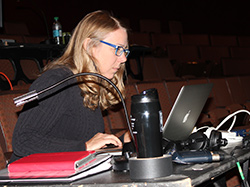
Sarah Pickett takes notes during a recent rehearsal of The Underpants that she sound designed for Syracuse Stage.
Sarah Pickett, sound designer and composer, assistant professor of sound design and music composition at Carnegie Mellon University in Pittsburgh, and Director of Diversity Outreach for USITT’s Sound Commission.
You’ve had a lot of different experiences. How did you get to sound design?
Sarah: I was born in Syracuse (NY) but spent part of my childhood in the Netherlands and grew up speaking Dutch and English. I studied piano with Lucille Sack and melodic percussion with Ernest Muzquiz, and I studied voice growing up. I got my BFA in Musical Theatre from Syracuse University … then I lived in NYC and spent several years working in theatre and three punk rock bands, one of which, Triple Forbidden Taboo, put out a couple records.
Then I got into Japanese studies, went to Japan to teach English for three years and came back to get a Master’s in Asian Studies from Cornell University. That was a sidelight, but it really influences my perspective as an artist. Living in a remote fishing village in rural Japan, I was ‘other’ for the first time in my life, in an extreme and real way. I learned what it really means to be an outsider.
Then, after doing some recording work on a film, I began to pursue sound design. I got an MFA in Sound Design from Yale School of Drama in 2008, and I think I’m done earning degrees now.
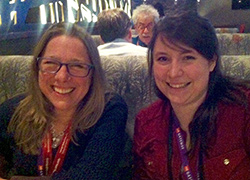
Sarah and her Gateway mentee, Lydia Pearce at USITT 2015.
How did you get involved in USITT?
I went to USITT the first time in 2013, my first year teaching at CMU. My colleague Joe Pino encouraged me to attend the Sound Commission programming session, and when I got there, I was the only woman in a room of 20 to 40 people. As I sat there, one other woman entered the room. But I knew there were other women in sound at the Conference because friends of mine were there. So I said on Twitter, ‘Hey, let’s go to dinner and talk about why we’re not more involved.’
It turned out a lot of people thought it was a closed session because it didn’t say ‘open.’ So we told David Grindle and they fixed that. And the next year we got a greater diversity of people to come. The racial mix is still lopsided. There are men of color in the sound commission, but it’s an area we definitely need to work on.
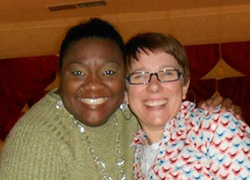
With her friend and CMU colleague, the late Tayneshia Jefferson, who inspired the Gateway Program.
Tell us about your Diversity Outreach role and the Sound Inclusion scholarship?
The sound commission was talking about how we want to do more than just state that our meetings are open – we want to be proactive and get people engaged and involved! (Commissioner) Dave Tosti-Lane said, ‘What if we created the position of Director of Diversity Outreach and also gave a scholarship?’ He was instrumental in creating a scholarship to bring someone from an underrepresented group to the Conference via the Sound Commission.
Have you felt underrepresented as a woman in sound?
In the early to mid ‘80s, things were different than they are now. Early on, working as a load-in worker in the Berkshires, I did feel at times that there was a difference in how men and women were treated. I don’t feel that way anymore. I do have female students who feel that way, and I always encourage them to take the lead in activating change … Women have been underrepresented, but I honestly think that’s going to change soon. Over 50 percent of our (CMU) students in the area of sound are women now.
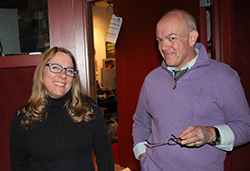
Visiting her Syracuse University mentor, Syracuse Stage Resident Sound Designer Jonathan Herter, while in town for tech on The Underpants.
Please talk about being a Gateway mentor?
After Tayneshia (Jefferson) passed away, Tina Shackleford asked me to mentor for the Gateway Program (established in Tayneshia’s memory), and it was a wonderful experience. You get to know people from backgrounds that aren’t really represented in the backstage industry, and honestly, that changed the way I think about USITT. It made me think that USITT could be, in many ways, life-changing for people. Because through USITT, people can be exposed to so many key players in the industry that they wouldn’t have access to, and it would take years to develop those contacts. So it’s like a fast track, because theatre is all about contacts.
I think Tayneshia would be incredibly pleased and proud that we are taking it to the next level.
You just designed a show in Syracuse while working at CMU in Pittsburgh. How do you sound design remotely?
We hold meetings through video chat to talk about the play and the overall design concept. We email ideas back and forth, and once we start making decisions, we make a Dropbox folder and share with the team. I make a QLab session so they can play the cues in rehearsal and the Stage Manager will give me feedback. Then I come for Tech Week to make sure it all works and to train the assistant who will run the show.
That said, I really enjoy being in rehearsal. For me, it’s important to be in some early rehearsals because you take cues from the body language and how the actors approach the text. So it’s hard for me to be doing desk work remotely, and having to split my focus with teaching, because I’m also involved in my students’ productions. But it’s really important that I stay active for my students and my university demands that I show a continuous body of work in the field.
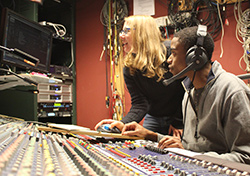
Working with Syracuse Stage Sound Apprentice Ryan Johnson.
Do you often compose as well as design?
It depends on the gig. When I work at OSF, it’s a composition gig, and I’m also responsible for all the sound design elements, including how to implement body mics on upwards of 27 actors … Some shows, it depends on the size, the amount of time and the budget how you approach it. For example, if you’re writing orchestrated music, you need to determine how much time it will take and how many instruments to record versus how many will be virtual. I mean, you can’t get away with a virtual cello. That doesn’t fly. But you might get away with a virtual harp.
What would you tell a student considering sound design as a career?
I would say, ‘Understand theatre history and music history, and understand how to look at the text, because it’s not just about the sound technology elements, but it’s also about the storytelling. So it’s important if you want to be a theatre sound designer that you can do dramaturgy. If you want to be a sound engineer in addition to that you need to understand how the science works, you need to understand the laws of physics as they relate to sound.
Thank You! See you at USITT 2016 in Salt Lake!

